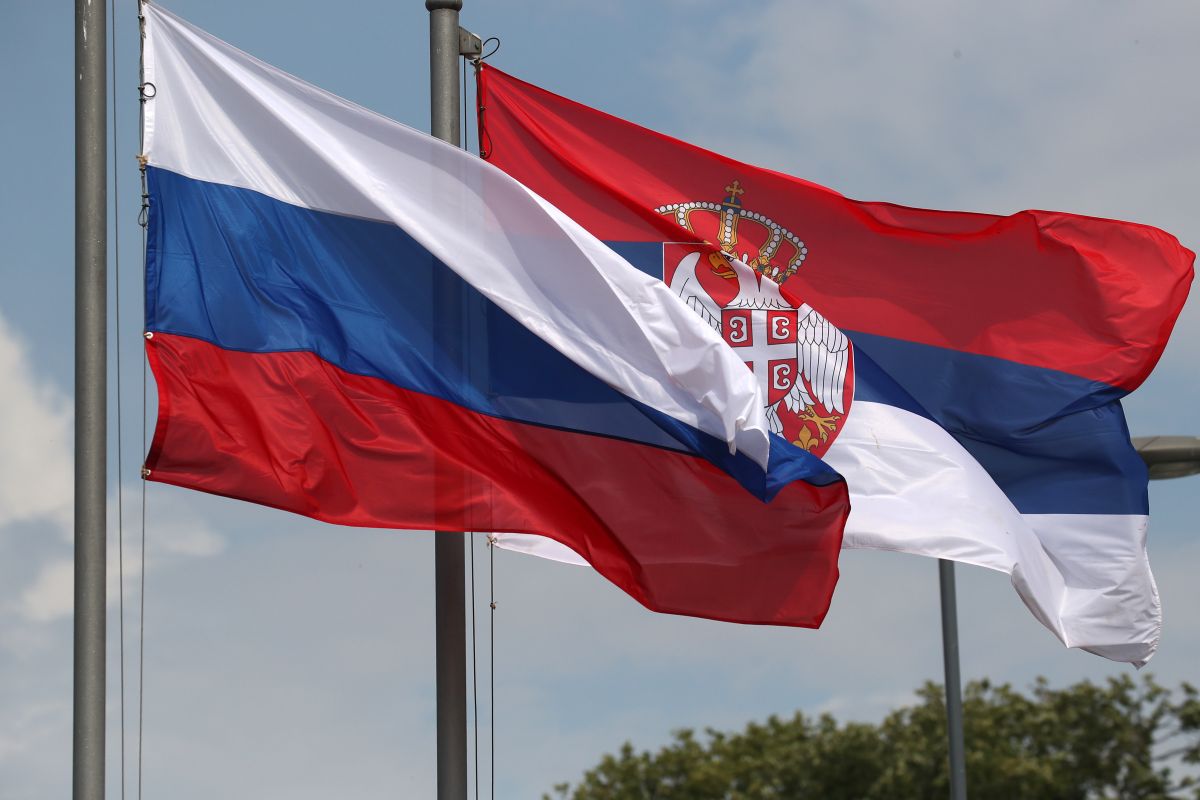Serbia on Russia's Attack on Ukraine
Serbia is the only country in Europe, excluding Belarus, that, apart from its support of the UN resolution, has not condemned Russia’s invasion of Ukraine. This position results from the political and economic ties to Russia as well as the sympathy of the Serbian society towards it, which is important a month before a general election. Most media in Serbia are dependent on the ruling parties and serve to maintain their power, and in general they repeat Russian propaganda.
 Fot. Valery Sharifulin/TASS/Forum
Fot. Valery Sharifulin/TASS/Forum
What is the reaction of the Serbian authorities?
The government of the conservative-liberal Serbian Progress Party (in power since 2012), its coalition partners, and chairman, President Aleksandar Vučić (since 2017), have not condemned Russia’s armed attack on Ukraine. This is an exception in Europe (not counting Belarus, an aggressor in the war, and Armenia and Azerbaijan, which are geographically outside the continent). In its position of 25 February, the Serbia’s National Security Council limited itself to a statement about respecting the principles of international law and supporting the territorial integrity of Ukraine. Serbia has not joined the Western sanctions imposed on Russia, “guided exclusively by protection of its vital economic and political interests”. And, not only has it not closed the airspace to Russian planes but also almost doubled the number of Air Serbia connections from Belgrade to Moscow and St. Petersburg—some of the few flights between Russia and the rest of Europe. The Serbian state is not sending aid to Ukraine. Serbia, however, was among 141 members of the United Nations that in special Resolution ES-11/1 of 2 March condemned Russia’s declaration of a “special military operation” and called on it to withdraw its troops from Ukraine and to withdraw recognition of the independence of the two so-called people’s republics.
Where does Serbia’s position come from?
Serbia, which is the only Balkan state not interested in NATO membership, and in its foreign policy are guided by the principle of equal distance between the EU, the U.S., Russia, and China, explaining its position as neutrality. It has maintained close political and economic relations with Russia and is its key ally in the Balkans. The Kremlin did not recognise Kosovo’s independence, which led to Serbia becoming energy dependent on Russia. The country sold most of its shares in the state-owned company for natural gas and crude oil (most of which come from Russia) and in 2013 raised the relationship to the rank of a strategic partnership. Such relations led to Serbia—alongside Bosnia and Herzegovina—as the only European states that did not vote on the UN resolution declaring the referendum in Crimea invalid in 2014, although the government in Belgrade had started accession negotiations with the EU two months earlier. The position of the authorities coincides with that of the majority of society. In a poll from the end of 2020, the plurality of citizens (40%) considered Russia Serbia’s best friend (16% perceived China as such, second in the ranking), and at the same time 57% believed that Serbia should harmonise its foreign policy with Russia and China (13% with the EU). As a result, the internal political cost of joining the EU sanctions or even unequivocally condemning Russia would be greater than failing to do so, which is particularly important in light of the general election planned for April.
What has been the opposition’s reaction?
Some leaders of the four-party extra-parliamentary coalition of United Serbia, which enjoys the greatest support among the opposition (around 17%), call on the government to condemn the aggression, and one party argues for imposing sanctions on the aggressor. The party points out that Serbia is obliged to do so by its own experience of bombing, and that it would not result in losing its neutral status. The remaining parties limit themselves to expressing respect for the territorial integrity of Ukraine, and so does the coalition “We have to”, which is the second most popular in the opposition (around 12%). Among the parties balancing on the 3% electoral threshold, a few nationalist parties support Russia’s actions, while the others usually do not take a decisive position. Meanwhile, parliamentary opposition is marginal. After some parties boycotted the 2020 elections, the real opposition in the 250-person parliament consists of just several deputies.
What does Serbian media report about Russia’s aggression against Ukraine?
Most media in Serbia—including all public outlets—are controlled by the authorities and disseminate information favourable to them. After the attack on Ukraine, they reported about Russia’s actions as a response to NATO threats and about the conquest of Ukraine in one day. Extreme manipulation of facts took place before the Russian invasion when newspapers announced in a coordinated way on the front pages that “Ukraine invaded Russia”. In the first days of the invasion, they avoided the term “war”, replacing it with “special operation” and other phrases and presenting mainly the arguments of Russian propaganda. A change of tone came a week after the outbreak of the war, including calling Russia an aggressor, which may indicate that the Serbian authorities want to leave themselves the option of changing their position. Media in Serbia are among the most unreliable in Europe. In the 2021 World Press Freedom Index by Reporters Without Borders, Serbia was 93rd, directly behind Hungary (Montenegro is ranked worse in the Western Balkans, and Bulgaria is worst in the EU), and disinformation, including portraying the Ukrainians as the aggressor, will cause a further decline in that ranking.


